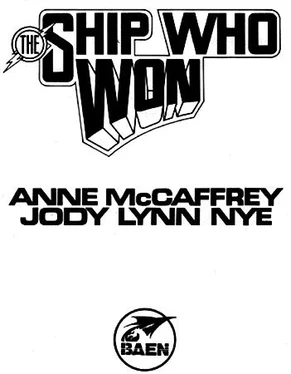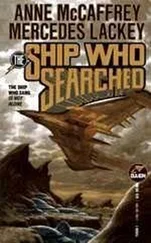Энн Маккефри - The Ship Who Won
Здесь есть возможность читать онлайн «Энн Маккефри - The Ship Who Won» весь текст электронной книги совершенно бесплатно (целиком полную версию без сокращений). В некоторых случаях можно слушать аудио, скачать через торрент в формате fb2 и присутствует краткое содержание. Год выпуска: 1994, ISBN: 1994, Издательство: Baen, Жанр: Фантастика и фэнтези, на английском языке. Описание произведения, (предисловие) а так же отзывы посетителей доступны на портале библиотеки ЛибКат.
- Название:The Ship Who Won
- Автор:
- Издательство:Baen
- Жанр:
- Год:1994
- ISBN:0-671-87595-7 / 978-0-671-87595-4
- Рейтинг книги:3 / 5. Голосов: 1
-
Избранное:Добавить в избранное
- Отзывы:
-
Ваша оценка:
- 60
- 1
- 2
- 3
- 4
- 5
The Ship Who Won: краткое содержание, описание и аннотация
Предлагаем к чтению аннотацию, описание, краткое содержание или предисловие (зависит от того, что написал сам автор книги «The Ship Who Won»). Если вы не нашли необходимую информацию о книге — напишите в комментариях, мы постараемся отыскать её.
The Ship Who Won — читать онлайн бесплатно полную книгу (весь текст) целиком
Ниже представлен текст книги, разбитый по страницам. Система сохранения места последней прочитанной страницы, позволяет с удобством читать онлайн бесплатно книгу «The Ship Who Won», без необходимости каждый раз заново искать на чём Вы остановились. Поставьте закладку, и сможете в любой момент перейти на страницу, на которой закончили чтение.
Интервал:
Закладка:
Who were they? Any spacefarer from Central Worlds knew the emblem of a brainship. Even land dwellers had at least seen tri-dee images of the protective titanium pillar in which a shellperson was encased. Not to know, to be attempting to open her shell without care for the person inside meant that they must not be from the Central Worlds or any system connected to it. Aliens? Could her attackers be from an extra-central system?
When she was convinced that the salvagers were just about to sever her connections to her food and air recycling system, the scratching stopped. As suddenly as the intrusion had begun, Carialle was alone again. Realizing that she was now on the thin edge of sanity, she forced herself to count, thinking of the shape of each number, tasting it, pretending to feel it and push it onward as she thought, tasted, and pretended to feel the next number, and the next, and the next. She hadn't realized how different numbers were, individuals in their own right, varying in many ways each from the other, one after the other.
Three million, six hundred twenty-four thousand, five hundred and eighty three seconds later, an alert military transport pilot recognized the beacon signal. He took her shell into the hold of his craft. He did what he could in the matter of first aid to a shellperson—restored her vision. When he brought her to the nearest space station and technicians were rushed to her aid, she was awash in her own wastes and she couldn't convince anyone that what she was sure had happened—the salvage of her damaged hull by aliens—was a true version of her experiences. There was no evidence that anything had touched her ship after the accident. None of the damage could even be reasonably attributable to anything but the explosion and the impacts made by hurtling space junk. They showed her the twisted shard of metal that was all that had been left of her life-support system. What had saved her was that the open end had been seared shut in the heat of the explosion. Otherwise she would have been exposed directly to vacuum. But the end was smooth, and showed no signs of interference. Because of the accretion of waste they thought that her strange experience must be hallucinatory. Carialle alone knew she hadn't imagined it. There had been someone out there. There had!
The children's tales, thankfully, had not turned out to be true. She had made it to the other side of her ordeal with her mind intact, though a price had to be extracted from her before she was whole again. For a long time, Carialle was terrified of the dark, and she begged not to be left alone. Dr. Dray Perez-Como, her primary care physician, assigned a roster of volunteers to stay with her at all times, and made sure she could see light from whichever of her optical pickups she turned on. She had nightmares all the time about the salvage operation, listening to the sounds of her body being torn apart while she screamed helplessly in the dark. She fought depression with every means of her powerful mind and will, but without a diversion, something that would absorb her waking mind, she seemed to have «dreams» of some sort whenever her concentration was not focused.
One of her therapists suggested to Carialle that she could recreate the «sights» that tormented her by painting the images that tried to take control of her mind. Learning to manipulate brushes, mixing paints—at first she gravitated toward the darkest colors and slathered them on canvas so that not a single centimeter remained «light.» Then, gradually, with healing and careful, loving therapy, details emerged: sketchily at first; a swath of dark umber, or a wisp of yellow. In the painstaking, meticulous fashion of any shellperson, her work became more graphic, then she began to experiment with color, character, and dimension. Carialle herself became fascinated with the effect of color, concentrated on delicately shading tones, one into another, sometimes using no more than one fine hair on the brush. In her absorption with the mechanics of the profession, she discovered that she genuinely enjoyed painting. The avocation couldn't change the facts of the tragedy she had suffered, but it gave her a splendid outlet for her fears.
By the time she could deal with those, she became aware of the absence of details; details of her schooling, her early years in Central's main training facility, the training itself as well as the expertise she had once had. She had to rebuild her memory from scratch. Much had been lost. She'd lost vocabulary in the languages she'd once been fluent in, scientific data including formulae and equations, navigation. Ironically, she could recall the details of the accident itself, too vividly for peace of mind. Despite meticulously relearning all me missing details concerning her first brawn, Fanine—all the relevant facts, where their assignments had taken them—these were just facts. No memory of shared experiences, fears, worries, fun, quarrels remained. The absence was shattering.
Ships did mourn the loss of their brawns: even if the brawn lived to retire at a ripe old age for a dirtside refuge. Carialle was expected to mourn: encouraged to do so. She was aware only of a vague remorse for surviving a situation that had ended the life of someone else. But she could not remember quite enough about Fanine or their relationship to experience genuine grief. Had they even liked one another? Carialle listened to hedrons of their mission reports and communiques. All of these could be taken one way or the other. The nine years they had spent together had been reduced to strict reportage with no personal involvement that Cari could recall.
As occupational therapy, Carialle took a job routing communication signals coming in to CenCom, a sort of glorified directory-assistance. It was busywork, taking little effort or intellect to do well. The advantage lay in the fact that voices and faces surrounded her.
She was ready for a new ship within two years of her rescue, and thank God for required insurance. As soon as the last synapse connection was hooked up and she was conscious again, Carialle felt an incredible elation: she was whole again, and strong. This was the way she was meant to be: capable of sailing through space, available and eager for important missions. Her destiny was not to answer communication systems or scuttle on a grav-carrier through corridors filled with softshells.
The expenses of the rescue operation and her medical care had been assumed by CenCom since that last mission had been hazardous, but the new CX-963 got quite a shock at the escalation of price in ship hulls. Her insurance had been based on purchase, not replacement price. She'd done a preliminary assessment of the cost but erroneously based her figures on those of her original ship-self. Her savings vanished in the margin between the two as unseen as a carbon meteor in atmosphere. She'd have no options on missions: she'd have to take any and many, and at once, to begin paying her enlarged debt.
Concurrently her doctors and CenCom urged her to choose a new brawn. After losing her last so spectacularly, Carialle was reluctant to start the procedure; another choice might end in another death. She agreed to see one man who came particularly well recommended, but she couldn't relate at all to him and he left in the shortest possible courteous time. She didn't have to have a brawn, did she? Brainships could go on solo missions or on temporary assignments. She might accept one on those terms. Her doctors and CenCom said they'd check into that possibility and left her alone again.
Though there were rarely so many, nine B&B ships were currently on the Regulus CenCom base, either between missions or refitting. She did have the chance to speak with other shellpeople. She was made to feel welcome to join their conference conversations. She knew that they knew her recent history but no one would have brought the subject up unless she did. And she didn't. But she could listen to the amiable, often hilarious, and sometimes brutally frank, conversations of her peers. The refits were five 800s and two 700s with such brilliant careers that Carialle felt unequal to addressing them at all: the eighth was preparing for a long mission, and there was herself. On an open channel, the brainships did have a tendency to brag about their current partner, how he or she did this and that, and was so good at sports/music/gaming/dancing, or how silly he or she could be about such and such—but hadn't they discovered Planet B or Moon C together, or managed to get germdogs to Colony X and save ninety percent of the afflicted from horrible deaths? The 800s were fond of reciting the silly misunderstandings that could occur between brain and brawn. Within Carialle, a wistfulness began to grow: the sense of what she, partnerless, was lacking.
Читать дальшеИнтервал:
Закладка:
Похожие книги на «The Ship Who Won»
Представляем Вашему вниманию похожие книги на «The Ship Who Won» списком для выбора. Мы отобрали схожую по названию и смыслу литературу в надежде предоставить читателям больше вариантов отыскать новые, интересные, ещё непрочитанные произведения.
Обсуждение, отзывы о книге «The Ship Who Won» и просто собственные мнения читателей. Оставьте ваши комментарии, напишите, что Вы думаете о произведении, его смысле или главных героях. Укажите что конкретно понравилось, а что нет, и почему Вы так считаете.





![Энн Маккефри - Неразлучная пара [= Неразлучные]](/books/252704/enn-makkefri-nerazluchnaya-para-nerazluchnye-thumb.webp)

